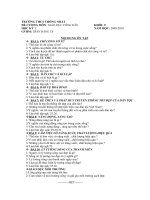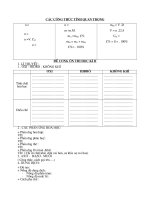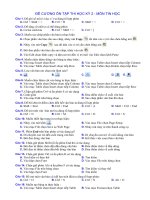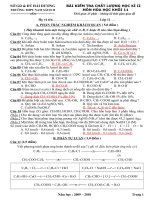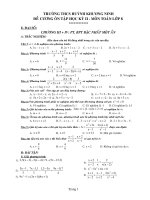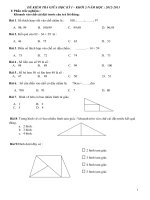Đề cương ôn tâp AV8 Kì 2
Bạn đang xem bản rút gọn của tài liệu. Xem và tải ngay bản đầy đủ của tài liệu tại đây (224.44 KB, 14 trang )
Krongpak-daklak
REVISION OF THE SECOND-TERM EXAMINATION (8th form)
1,/ TENSES: ( thì )
1.Simple Present tense: ( thì hiện tại đơn )
- To be: am, is, are
I am ( not )
_ Am I --- ?
He/ She/ It/ 1
is ( not )
_ Is he /she / it / 1 --- ?
We/ You/ They/ 2
are ( not )
_Are we / you / they / 2 --- ?
- Ordinary verbs:
I/ We/ You/ They/ 2 + V
_
don’t + V
_ Do+ I/ we/ you/ they/ 2 + V
He/ She/ It/ 1 + Vs/es
_
doesn’t + V
_ Does + he/ she / it/ 1 + V ?
Từ nhận diện: always, usually, often, sometimes, seldom, never, every,…
2.Present continuous tense: (thì hiện tại tiếp diễn )
S+ am/ is / are + V.ing
Từ nhận diện: now, at present, at the moment,… hoặc Look! ; Listen!; Be careful!;…
3.Simple past tense: (thì qua khứ đơn )
- To be : was , were
I / He / She / It / 1 + was ( not )
_ Was + I / he / she / it / 1 --- ?
We / You / They / 2 + were ( not )
_ Were+ we/ you / they / 2 --- ?
-Ordinary verbs:
-Did + S+ V ?
đĐộng từ co qui tắc : them “ed”
( Ved )
_S+ didn’t + V
đĐộng từ bất qui tắc : sử dụng cột 2 (Vcột 2 )
Từ nhận diện: yesterday, last, ago, mốc thời gian ở qua khứ ví dụ 2002, 1998,…
4.Simple future tense: ( thì tương lai đơn )
S+ Will + V
Won’t + V
I, We + shall +V
Shan’t+V
Will + S + V …?
Shall+ I,We +V?
Từ nhận diện: tomorrow, next, in the future,…2050....
5. The near future tense: ( thì tương lai gần hay tương lai với dự định )
Diễn tả sự việc sẽ xảy ra trong tương lai nhưng được sắp xếp sẳn hay dự tính trước.
S + am / is / are + going to + V
S + am not / is not / are not + going to + V
Am / Is / Are + S + going to + V ?
Ex: What are you going to do tonight? ( tối nay bạn dự định lam gì?)
_ I’m going to do my math homework. ( toi dự định lam bai tập toan )
6. Past progressive ( Thì quá khứ tiếp diễn )
- Form :I,She,He,1+ WAS + Present pasticiple ( V-ing )
You,We,They,2+Were+V-ing
- Use: - diễn tả sự kiện xảy ra ở một thời điểm cụ thể ( giờ ) trong quá khứ
Ex: What were you doing at 2 p.m. yesterday?
- diễn tả một sự kiện đang diễn tiến bất chợt một sự kiện khác xảy đến ở quá khứ
Ex: Last night when I was doing homework, the electricity went out.
- diễn tả hai hay nhiều sự kiện xảy ra cùng một lúc song song ở quá khứ
Ex: Last Friday as I was swimming at the pool, my father was visiting the City Museum.
* Note: Thì ù khứ tiếp diễn thường dùng với WHEN,WHILE hay AS để chỉ sự kiện đang diễn
tiến.
* ALWAYS with the past progressive: always dùng với thì tiếp diễn để diễn tả sự kiện thường
xuyên xảy ra với sự không hài lòng hay than phiền (Ex: He was always coming to work late.)
7.. Present perfect tense( Thì hiện tại hoàn thành )
- Use :- Dùng để miêu tả một hành động xảy ra trong quá khứ nhưng kết quả còn lưu đến hiện
tại
- Dùng để miêu tả một hành động vừa mới xảy ra ( ta dùng với JUST)
- Dùng để miêu tả một hành động được hoàn tất sớm hơn sự mong đợi (ta dùng với
ALREADY) Ex: I have already finished this work.
- Dùng để miêu tả một hành động từ trước đến giờ chưa hề hoặc không hề xảy ra ( ta
dùng với EVER –NEVER) . Ex: Have you ever been to Hue? I have never gone.
- Dùng để miêu tả một hành động đã xảy ratrong quá khứ tính đến nay đã xảy ra được
bao lâu (FOR) hoặc đã xảy ra từ lúc nào (Since)
* For : Chỉ thời gian kéo dài bao lâu.
Ex: You have studied English for 4 years.
* Since: thời gian bắt đầu từ lúc nào
Ex: She has studied English since 2003
8.. Near Future: Be going to ( thì tương lai gaàn )
- Form : S + is / am/ are + going to + V(inf)
S+ is not/am not/are not +going to +V (inf)
Is/ Am/ Are +S + going to +V(inf)?
- Use : Dùng khi nói về một việc mà ai đó quyết định sẽ làm hay dự định sẽ làm trong tương lai.
Ex : There is a good film on TV tonight. I’m going to stay home to watch TV .
- Note : Be going to còn dùng để dự đoán một tình huống có thể xảy ra
Ex: I feel tired . I think I’m going to be sick.
2,. Adverb of place ( Trạng từ chỉ nơi chốn ): out side, inside, there, here, upstairs, downstairs
,next to ,under ,…………..
Ex: The money was finally found under the boards.
3,. Reflexive pronouns.( Đại từ phản thân): myself, yourself, himself, herself, itself, ourselves,
yourselves, themselves .
- Diễn tả hành động trở lại với chính người thực hiện .
+ Nó có thể làm túc từ (Object ) Ex: Be careful.. You’ll cut yourself.
+ Nó đứng ngay sau từ mà nó làm mạnh nghóa. Ex : An sent this letter itself.
- Đại từ phản thân làm mạnh nghóa cho chủ từ. Nó đứng ngay sau chủ từ, hoặc đứng ở cuối mệnh
đề /câu. Ex: Mary herself cleaned the floor.
4,. Modal verbs
- Form : + S + modal verb + V + ……….
Ex : I can sing very well.
- S + modal verb + not + V + ………
Ex : Hoa may not come to the party tomorrow.
? Modal verb + S + V + ………….?
Ex : May I come in ?
- Modal verb : must, ought to, have to,should
* MUST : là khiếm trợ động từ ( a modal ) diễn tả sự bắt buộc hay sự cần thiết có tính chủ quando cảm nghó của người nói. (Ex: He must do this exercise again.), hay diễn tả tính qui tắc hay lề
luật . (Ex: We must drive on the right.)
* HAVE TO : diễn tả sự bắt buộc hay sự cần thiết có tính khách quan – do yếu tố bên ngoài.
Ex: Your eyes are weak. You have to wear glasses.
* OUGHT TO + V(base form) (nên): diễn tả lời khuyên. Ex: We ought to obey our parents.
* SHOULD: diễn tả lời khuyên Ex: You should help the needed children.
* MAY / CAN / COULD : được dùng để diễn tả lời yêu cầu hay đề nghị
- Yêu cầu sự giúp đỡ: Can / Could + you + V + O / A,please ?(Ex: Can you help me
,please.)
- Đề nghị giúp ai: May + I + V + O/A ?; Let + me + V + O/A. ; Do you need any help?
Shall + I + V + O / A ? Ex: May I help you?
* WILL: duøng để diễn tả lời yêu cầu , đề nghị hoặc lời hứa
- Will + you + V + O + A / M , please? Diễn tả lời yêu cầu.
Ex: Will you turn of the fan, please ? I’m cold.
- I + will + V + O + A / M ? diễn tả lời đề nghị làm điều gì cho ai .
Ex: The phone is ringing . I’ll answer for you.
- S + will + V + O + A / M ? diễn tả lời hứa . Ex: I’m sory. This won’t happen again.
* Would / Do you + mind + . . . + ? diễn tả lời yêu cầu lịch sự .
- Would you mind + V-ing ( gerund) ? Ex:Would you mind telling me the result of the exam.
- Would / Do you mind if + I + V . . .? diễn tả yêu cầu được làm điều gì
Ex: Would you mind if I opened the window? Do you mind if I open the window?
5,. Used to + V(bare form) : diễn tả một thói quen trong quá khứ nay không còn
Ex: He used to play tennis.
* Note : Sự tương phản: USED TO + V(bare form) (Đã từng )
BE / GET + USED TO + NOUN PHRASE / GERUND ( Quen )
Ex: Ba was born in a famer family. He’s used to working in the sun.
6,. Adverb of Manner( Trạng từ chỉ thể cách ): thường theo sau tân ngữ nếu có Đa số trạng từ chỉ
thể cách được cấu tạo từ tính từ thêm hậu tố LY : adjective + ly = adverb
Ex: This man drives carefully.
7,. Commands, requests and advice in reported speech
* Commands in reported speech: Câu mệnh lệnh ở lời nói gián tiếp
( Don’t ) + V + O / A
S + told / ordered . . . + O + ( not ) + to V + O / A
Ex: “Turn off the light before going top bed,” my mother said to me.
→ My mother told me to turn of the light before going top bed.
Ex: “Don’t play with matches,” the mother said.
→ The mother warned her child not to play with matches.
* Requests in reported speech: Caâu yêu cầu ở lời nói gián tiếp
Please + (don’t ) + V + O / A hoaëc ( Don’t ) + V + O / A , please
S + asked / begged . . . + O + ( not ) + to V + O / A
Ex: Please turn on the light. → He asked me to turn on the light.
Ex: Please don’t make a noise here. → They asked us not to make a noise there.
* Advice in reported speech: Lời khuyên ơ lời nói gián tiếp . Lời khuyên có cấu trúc:
- S + should / ought to / had better + V + O / A.
- Why don’t + you + V + O / A ?
- If I were + O , I’d (not ) + V + O / A .
→ S + advised + O + ( not ) infinitive + O/A.
Ex: “ You’d better work hard for exam,” Tom said to his brother.
→ Tom advised his brother to study hard for the exam.
“If I were you,I’d not do such a thing,”Mai said to Lan. → Mai advised Lan not to do such a
thing.
8. Gerund (danh động từ ) : là dạng động từ tận cùng bằng “ – ING” và có chức năng của một
danh từ. Nó có thể làm :
- Chủ ngữ:
Ex: Smoking is harmful to health.
- Tân ngữ
Ex : We’re thinking about raising our class’s fund.
Ex: We practise speaking English in class.
- Làm bổ từ cho chủ từ
Ex: My interest is collecting stamps.
- Từ đồng vị
Ex: He has one desire , taking care of his old parents.
- Theo sau một số động từ : Ex: I’d like reading books.
9- Comparative and superlative adjectives ( So saùnh hơn và hơn nhất )
1. So sánh hơn
- Tính từ có một âm tiết : Adjective –er + than
Ex: I’m stronger than you.
- Tính từ có hai âm tiết trở leân: More + adj +than
Ex: My sister is more beautiful than
me.
2 So sánh hơn nhất
-Tính từ có một âm tiết : The + Adj –est
Ex: This tower is the tallest.
- Tính từ có hai âm tiết trở lên: The + most + adj
Ex:Hoa is the most beautiful in my
class
Note : Một số tính từ bất qui tắc
Good - better - the best
fas - farther - the farthest
Bad - worse - the worst
further - the furthest
10. Adjectives followed by an infinitive or a clause.
(Tính từ được theo sau bởi một động từ nguyên mẫu hay một mệnh đề.)
1.Tính từ chỉ cảm giác thường được theo sau bởi một cụm động từ nguyên mẫu (infinitive
phrase).
S + be + adjective + (not) infinitive phrase. Ex .: I’m glad to meet you again.
He was surprised to get me letter.
Một số tính từ khác như : sure, certain, right, careful, lucky, wrong, … được theo sau bởi một cụm
động từ nguyên mẫu. Ex . : He’s certain to win the game. Be careful not to dirty the picture.
2.Một số tính từ có thể được theo sau bởi một mệnh đề danh từ (a noun clause).
Ex: I’m glad ( that ) you can make it.
11. In order to – so as to + V( base form) : được dùng để diễn tả mục đích
Ex: He’s saving money in order to / so as to go on holiday next summer.
12.Passive Voice
Các điểm lưu ý:
+Có 1 số động từ khơng bao giờ đổi sang bị động: seem, appear, have.
+Khi đổi sang bị động những thành phần trong câu chủ động không đổi: trạng ngữ chỉ thời
gian , chỉ địa điểm, từ đệm.... phải giữ nguyên vị trí như trong câu chủ động.
+Nếu trong câu chủ động chủ ngữ là nobody, no one thì khi đổi sang bị động, động từ sẽ
để ở thể phủ định.
Cơng thức chung : S+BE+past participle(P2)
I. CÁC CƠNG THỨC CỤ THỂ CỦA CÁC THÌ:
1. Đối với Hiện tại đơn giản : S + am/is/are+P2
2. Đối với Hiện tại tiếp diễn : S +am/is/are+being+P2
3. Đối với Hiện tại Hòan thành: S + have/has+been+P2
4. Đối với Quá khứ đơn giản: S + was/were+p2
5. Đối với Quá khứ tiếp diễn: S + was/were+being+P2
6. Đối với Tương lai đơn giản: S + will+be+P2
7. Đối với Tương lai gần: S + to be+going to+Be+P2
8. Đối với Tương lai hòan thành: S + will have been+P2
9. Đối với Quá khứ hoàn thành: S + had been+P2
Notes: Các thì HTHT tiếp diễn, TLHT tiếp diễn, TL tiếp diễn, QKHT tiếp diễn không đổi
được sang bị động.
13. THỂ BỊ ĐỘNG CỦA MODAL VERB
1/ Cấu trúc 1: S + modal Verb +Verb infinitive(Vinf)
Dùng để chỉ hành động xảy ra trong hiện tại hoặc tương lai.
>>> Thể bị động S+modal verb + be +P2.
EX: I must do this homework.
>> This homework must be done.
13. -ed and -ing participle( Quá khứ và hiện tại phân từ )
- Hiên tại phân từ “- ING” còn gọi là phân từ tác động. Ex: His job is boring.
- Quá khứ phân từ “ – ED” còn gọi là phân từ bị tác động. Ex: This clock is broken.
* Quá khứ và hiện tại phân từ : Đứng trước danh từ, hoặc sau động từ liên kết
Ex: A tired worker is sleeping on the chair.
The story is interesting
* Quá khứ và hiện tại phân từ: được dùng để rút gọn mệnh đề tính từ
Ex: The boy is in my class . He’s reading a book. → The boy reading a book is in my class.
There are many books. They are written in English. → There are many books written in English
14,.Compound nouns ( danh từ kép)
- Noun + Gerund : danh từ làm túc từ cho danh động từ. Ex: fire – making , rice – cooking, …
- Gerund + Noun : danh động từ phân loại danh từ , chỉ loại và mục đích cho danh từ.
Ex: Washing-machine; working- condition; waiting – room ; . . .
14. Reported speech ( lời nói trần thuật) là câu thuật lại một cách gián
tiếp lời nói
của người khác. Để chuyển từ trực tiếp sang câu gián tiếp chúng ta phải:
* Một số thay đổi về thì (Tense change) :- Nếu động từ thường thuật (reporting verb) của câu ở
thì quá khứ thì phải lùi động từ chính về quá khứ một bậc khi chuyển từ lời nói trực tiếp (direct
speech) sang lời nói gián tiếp (indirect / reported speech) theo quy taéc sau :
Speaker’s words
Reported statement
Speaker’s words
Reported statement
will / shall
→
would / should
present simple
→
past simple
am / is / are going to →
was / were going to present continuous →
past continuous
past continuous
→ past perfect continuous must
→
had to
present perfect
→
past perfect
past simple
→
past perfect
can
→
could
Ex: Direct speech: “I’ll talk to Hoa.”said he. → Reported speech: He said he would talk to
Hoa
main verb
reporting verb
- Nếu động từ tường thuật ở thì hiện tại thì thì của động từ chính được giữ nguyên khi chuyển lời
nói trực tiếp sang gián tiếp.Trạng từ chỉ nơi chốn,thời gian và đại từ chỉ định được giữ nguyên.
Ex:
Direct speech : “I’m arriving at about 6.00.”says Brenda.
Reported speech : Brenda says she’s arriving at about 6.00.
Note: - Có thể dùng hoặc không dùng “that” sau động từ tường thuật.
Ví dụ : He said (that) he wasn’t going.
- says / say to + O → tells / tell = O
said to + O → told + O
Exï : He told (said to) Helen (that) he didn’t like coffee.
- Một số động từ không thay đổi khi chuyển sang lời nói gián tiếp.
Would → would, could → could, might → might, should → should, ought to → ought to
* Một số chuyển đổi khác (Some other changes) : Khi chuyển từ lời nói trực tiếp sang gián tiếp
mà động từ tường thuật ở thì quá khứ thì các trạng từ chỉ thời gian và nơi chốn và đại từ chỉ định
được chuyển đổi theo quy tắc sau :
Speaker’s words statement
Reported
today / tonight
that day / that night
tomorrow
the next day / the following day
yesterday
the day before /the previous day
ago / now
before / then
next/ on Monday
the next/ following Monday
last Monday
the previous Monday / the Monday before
the day after tomorrow
in two days’ time / two days later
this / these
that / those
here
there
Ex:
Direct speech : “ I’m leaving here tomorrow,” said Mary
Reported speech : Mary said (that) she was leaving there the next day.
15.Reported questions (
- Yes – No questions : thường được mở đầu bằng các động từ như “ ask, inquire, wonder,….” Và
ta dùng “if” hay “whether” trong lời nói trần thuật và theo sau các động từ mở đầu .
Ex: “ Do you see new friend?” he said → He asked if you saw new friends.
- Wh –questions : Thường được bắt đầu bằng các động từ “ask, wonder,want to know . . .”và
theo sau là các nghi vấn từ : who,which,whom,what,. . .
Ex: “ Who is going for a walk?” he asked them.
→ He asked them who was going for a walk.
16. (not ) adjective + enough + infinitive ( không ) đủ ……………….. để
Ex: The water is hot enough for me to drink.
She isn’t old enough to be in my class
PRACTICE
I. Choose the correct words or phrases to complete the sentences:
1. I can't decide…………………… to apply this program or not.
A. where
B. whether
C. what
2. Sue had her brother……………. her bike.
A. fix
B. fixing
C. to fix
3. Ian ……………… in Scotland for ten years. Now he lives in London.
A. has been living
B. lives
C. was living
4. ……………….a computer when you was living in the country?
A. Do you have
B. Did you have
C. Have you had
D. Were you having
5. Ben writes very quickly. He's ……………..
finished his essay.
A. for
B. been
C. already
6. That printer is………………………guarantee so the company will repair it.
D. how
D. fixed
D. has lived
D. yet
A. under
B. in
C. of
D. on
7. Do you know where
…………………? -"No, he didn't say."
A. Tom
went
B. has Tom gone
C. Did Tom go
D. Tom
has gone
8. "I don't believe in ghost." -"……………………"
A. Neither do I.
B. I do, too.
C. So do I.
D. I do either
9. Let's ................ to our teacher's office.
A. going
B. go
C. does
D. went
10. We didn't know what ............. next.
A. doing
B. do
C. to do
D. done
11. If you do not go, neither……………. I.
A. shall
B. do
C. shan't
D. won't
12. My house.................... in 1998.
A.build
B. built
C. were build
D. was
built
13. This is the boy............. Tim.
A. called
B. calls
C. calling
D. call
14. This cake tastes………………
A. terribly
B. terrible
C. well
D. badly
15. The question sounds very ………………..
A. ease
B. easily
C. easy
D. at ease
16.I…………… a film that interested me so much as the one I ………..last night.
A. have never watched/ watched
B. never watched/ watched
C. watched/ have watched
D. never have watched/ watched
17. The first papermaking machine …………………in the late 1700s by a Frenchman.
A. has been invented
B. was inventing
C. invented
D. was invented
18.Mr Roberts supervises and directs other workers in the factory. He's a………….
A. foreman
B. engineer
C. mechanic
D. manager
19. I'd like to borrow this book. Has Anna read it………………..?
A. for
B. done
C. already
D. yet
20. Would you………………..helping me with the washing?
A. like
B. mind
C. show
D. please
21. Our solar system is in the galaxy ……………… the Milky Way.
A. call
B. calling
C. to call
D. called
22. He wants to return to the village ………………..he was bor n.
A. when
B. where
C. what
D. which
23. Tim said he ……………….. a chocolate factory then.
A. visited
B. are visiting
C. has visited
D. was visiting
24. There's nothing wrong ................ her computer.
A. with
B. in
C. at
D. from
25. Mr. Pike is going.............. holiday at the moment.
A. on
B. in
C. at
D. off
26. Are you................. in detective films?
A. interest
B. interesting
C. interested
D. interests
27. What songs do you often sing.............. Christmas?
A. on
B. in
C. of
D. at
28. This house........... built by my grandfather in 1990.
A. is
B. were
C. is
29. In Australia, families and friends spend Easter afternoon..........
A. together
B. each
C. along
30 Mr Hung said he would go to Ha Noi …………..
A tomorrow.
B. yesterday
C. today.
D. was
D. with
D.the following day
II. Supply the correct verbs form or tenses
1. He (work)___________ for that company for 5 years.
2. What you (do)___________ when we phoned you last night?
3. The man (stand) _______________near the door is my brother.
4. It’s difficult (do)________________ this project.
5. The teacher ordered Tom (go) _____________to the board.
6. When we met George and Linda yesterday, we (walk)_____________ through the park.
7. It started (rain)_____________ when they left home.
8. The accident (cause) _______________by the fast truck driver last Sunday.
9. It was late, so we decided (take) _______________a taxi home.
10. This house is quite old. It (build) _______________over 100 years ago.
11. The phone rang while An (have) ______________dinner.
12. Her son (not visit) ________________her for a long time.
III. Simple past & present perfect;
1. I (have) ________ these shoes since my 18th birthday.
2. I (tidy) ________my desk, but now it’s in a mess again.
3. The last time I (go) _________ to Brighton was in August.
4. I’d like to meet a ghost, but I (never/ see) ___________one.
5. And the race is over! And Micky Thimson (win) _________in a record time.
6. I (work) _____________for a company for a year that was after college.
7. What time you (get) _____________to work this morning?
8. Martin (be) __________to Greece five times. He loves that place.
9.The President (come) ____________out of the building and is going to make a speech.
10. You won’t believe this, but I’ve got some tickets for the concert. – Oh, well done! How you
( get) _____________them?
11. Of course I can ride a bike. But I (not/ ride) __________one for a year.
12. You ever ( bake) ______________your own bread?
13. Tom ( left) ____________-a message for you. He (ring) ___________last night.
14. You (see) _____________the news today? – no, not yet.
15. We ( move ) ___________here in 1993. We ( be) ____________here for a long time.
IV Simple past & past progressive:
1. The door bell (ring) ____________while Tom (watch) ______________-TV.
2. How fast you (drive) ____________when the accident (happen)__________________?
3. Ann and Susan (make) ___________dinner when Martin __________________(arrive).
4. The light (go) ________out while we (have) __________dinner.But it (come) _________on again
after ten minutes.
5. What you (do) _________at this time yesterday? - I (work) ___________on the computer.
6. It suddenly (begin) ___________-to rain while Laura (sit) _____________in the garden.
7. Sam (take)______________a photo of me while I (not/ look)________________--.
8. When I (see) ___________them, they (try) ___________to find a new house near their work.
9. I (walk) __________along street when I suddenly (feel) _________somethings hit me in the
back.I (not/know) _____________what it was.
10. last night I (drop) ___________a plate when I (do) ____________the washing up. Fortunately I
(not/ break)___________________.
V Simple present the simple future:
1. We ( go) ___________out when the rain (stop)__________________.
2. She ( not/come) ___________until you (be) _______________ready.
3. I (come) ____________--and see them before I ( leave) ______________here.
4. We ( phone) ___________you as soon as we ( arrive ) _____________in Hanoi.
5. When I (see) __________Mr. Pike tomorrow, I ( give) ___________him your message.
6. He promises he ( come) ___________before the sun (rise)_____________-.
7. You ( be) ___________late if you (not/ hurry)_________________.
VI .Reported speech
1. I said to Mrs. Hoa, "What sports do you often play?"
I asked Mrs. Hoa .........................................................
2. "Is there a TV in the bedroom?", I asked the landlady.
I asked the landlady .......................................................
3. "Let's go to the cinema. ", Lien said.
Lien suggested ....................................................
4."I am going to Hanoi tomorrow", he said.
He said that .............................................
5. My father said; “ Don’t stay up lale.”
My father told.............................
6. Lan said;” Decorate the classroom with colorful lights.”
Lan advised....................................................
7. He said: “I shall expect her”.
He said………………………………………
8. He said: “I can’t find my hat”
He said……………………………………….
9. He said: “I am going to the cinema tomorrow”.
He said………………………………
10. He says to me: “I will do it if I can”ws.
He told ………………………………
11. He said to me: “You are looking much better”.
He told…………………………………
12. I said to him: “Your car has been stolen”.
I told….………………………
13. He says: “The river is rising early this year”.
He said …………
14. The boy said to his father: “I am going to finish this job”
The boy told………………………………….
15. She says to me: “I’ll come as soon as I can”.
She told………………………………………
16. He said: “I am living in Paris now”.
He said …………………………………….
17. The officer said to the soldiers: “Capture that hill in front of you!”.
The officer told the soldiers …………………
18. He says to me: “I will see you tomorrow”.
He told me………………………………
19. He said to his friend: “Did you see the accident yesterday?”
He told …………………………
20. Nam said to his father: “Please let me go to Paris”.
Nam told his father………………………………
21. She said to me: “Whose is this book?”
She told me………………………………
22. He said to me: “Come and see me tomorrow!”
He told me……………………………
23. He said to me: “How did you come here?”
He told me………………………………
24. She said to her boyfriend: “Why haven’t you written to me?”
She asked her boy friend………………………
25. He said: “Have you finished your task, Nam?”
He asked………………………………
26. He said: “Don’t sit on my hat!”
He said to me………………………………
28. I said to my servant: “Go and buy some meat! Do not be long!”
I told my servant……………………
29. “What is the matter?” said Nam to me. “Are you ill?”
Nam asked me………………………………
30. They say: “We are tired this morning. We need some rest”
They said . …………………………
31. He said to me: “Why do you want to wait? You must stay here for a long time”
He asked me.………………………………
32. I said: “Can you pay for it? It is very expensive”.
I asked him………………………………
33. “Stop!” Cried the passenger to the driver. “I want to get out.”
The passenger told the driver.………………………………
34. He said: “Yesterday evening I met Nam. He has bought a new car”.
He said………………………………
35. He said to her: “Please, lend me this pencil. I have lost mine. Have you had another for
yourself?”
He begged her……………………………………….
Passive voice
VII. .Rewrite the sentences using passive voice:
1. They make these artificial flowers of silk.
……………………………………………………………………………………………………..
2. We don’t use this kind of computers to do that job nowadays.
……………………………………………………………………………………………………..
3. How do people learn languages?
……………………………………………………………………………………………………..
4. Did they feed Lulu last night?
……………………………………………………………………………………………………..
5. They ate all the food before they got to the party.
……………………………………………………………………………………………………..
6. The thief didn’t broke the windows.
……………………………………………………………………………………………………..
7. Nick will bring the pizzas to our house.
……………………………………………………………………………………………………..
8. Where will your company send you next year?
……………………………………………………………………………………………………...
9. Hoa won’t buy that dress.
…………………………………………………………………………………………………….
10. They will have to change the date of the meeting again.
…………………………………………………………………………………………………….
11. The mechanic is repairing Judy’s car.
…………………………………………………………………………………………………….
12. Are they digging the hole on the wrong side of the road?
……………………………………………………………………………………………………..
13. He is not doing homework at the moment.
……………………………………………………………………………………………………...
14. They were cleaning the floor when I arrived.
……………………………………………………………………………………………………...
15. My sister wasn’t watching that cartoon at 8.00 last night.
……………………………………………………………………………………………………...
16. Were you playing chess at that time?
……………………………………………………………………………………………………..
17. They are going to steal your money if you are not careful.
……………………………………………………………………………………………………
18. Ba isn’t going to decorate the living room.
…………………………………………………………………………………………………….
19. Are they going to build a new road here?
…………………………………………………………………………………………………….
20. He has spelt this word wrongly.
…………………………………………………………………………………………………….
21. Somebody has taken some of my books away.
…………………………………………………………………………………………………….
22. They have provided the victims with food and clothing.
………………………………………………………………………………………………………
23. Have they changed the windows of the library?
……………………………………………………………………………………………………...
24. Has Tom finished the work?
……………………………………………………………………………………………………..
25. How long have they waited for the doctor?
……………………………………………………………………………………………………..
26. We haven’t painted the gate yet.
…………………………………………………………………………………………………
…...
27. She hasn’t heard about the show.
…………………………………………………………………………………………………
…...
28. Mai hasn’t sent the letters to her pen pal.
…………………………………………………………………………………………………
…...
VIII. Rewrite the following sentences in such a way that it means exactly the same as the
sentences printed before it.
1. Is it all right if I take some photograph?
Would you mind _______________________________________________?
2. We like this place,” the tourist said.
The tourist said ___________________________________________
3. She invited me to the party.
I ____________________________________________________________
4. I started playing the piano two years ago.
I have ________________________________
5. John said, “Is Phong Nha Cave in Southern Viet Nam, Nhi?”
John asked ___________________________________________________
6. This question is difficult to understand
It’s _________________________________________________________
7. Many people speak English in the world
English _____________________________________________________
8. Shall I carry your luggage?
Would ______________________________________________________?
9. The film was so boring.
We were ____________________________________________________________
10. Where is the station?
He asked me __________________________________________________________
11. The last time I played tennis was in 1990.
I haven’t ___________________________________________________________
12. Clement Clark Moore wrote the poem in 1832.
The poem _________________________________________________________
. IX/ Choose the correct word in parentheses to complete each sentence:
1) The Christmas cards (are sent / were sent / sent / sending) out by post last week.
2) Who (afraid / tired / sure / compiled) of this document?
3) I don’t think TV was invented (in / on / since / at) the 19th century.
4) It rained (since / while / whether / although) we were sleeping last night.
5) You must separate the rice (from / for / of / without) the husk in this contest.
6) How to (prevent / import / elevate / carve) people from throwing bottles away?
7) Don’t let the victim (get / to get / got / getting) cold. Cover him with something.
8) He passed the (marine / council / entrance / tribe) exam to the Oxford University.
9) I make a fire by rubbing pieces of (ranger / heritage / compost / bamboo) together.
10) Will you turn (off / down / on / around) TV for me? I want to watch the 7.00 news.
11) It is difficult ( remember / remembering / remembered / to remember) her address.
12) Nhatrang’s one of the most famous (waterfall / tourist / prison / wharf) attractions.
13) The Christmas cards (sent / were sent / are sent) to their friends by post last week.
14) I’m looking forward to (see / will see / saw / seeing) you soon.
15) Remember to keep the victim (religious / awake / famous / ancient).
X. Supply the correct form of the verbs in the brackets in the correct form:
1 .The Moon (move)..............around the Earth .
2 ....................you (watch ) ....................the soccer match yesterday.?
3 .My mother (travel)..............................Hai Phong tomorrow.
4 .We (live)...............in Dak Lak for ten years
5. She (stay) ............ here for 2 weeks.
6. We should go home. It (get) ......... darker and darker.
7. Water ( boil)............. at 1000C
8. I (meet) ............... Lan at the station yesterday.
9. Would you mind (take) ...........................some photos?
10. It was late, so we decided (take)........................... a taxi home.
XI. Rewrite the following sentences as directed in the brackets.
1. We have studied French since 2006. (Turn into passive voice)
............................................................................................................................................
2. She asked me, " Do you want to visit Da Lat". (Turn into reported speech)
............................................................................................................................................
3. Peter said, "I must go to my office tomorrow" (Turn into reported speech).
............................................................................................................................................
4. Tet lasts ten days. ( Make the question for the underlined word)
................................................................................................................................................
5. People speak English all over the world. (Turn into passive voice)
..........................................................................................................................................
6. A milk bottle can be reused thirty times. ( Make the question for the underlined word)
..........................................................................................................................................
7. Jack said, "I'm living in Tokyo now". (Turn into reported speech).
.........................................................................................................................................
8. I asked Lan, "Are you busy tonight?". (Turn into reported speech).

